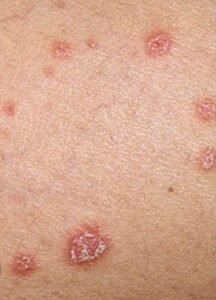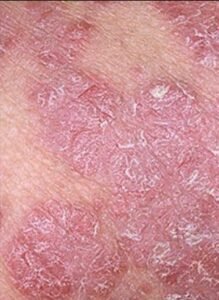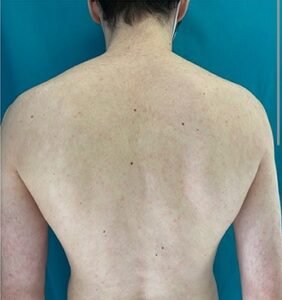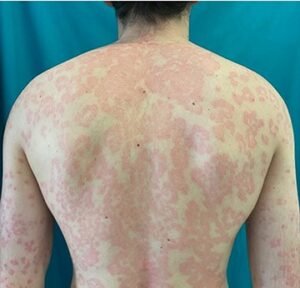Psoriasis Treatment
What are Psoriasis?
 Psoriasis is a chronic inflammatory skin disorder that predominantly involves the skin, nails, and joints. It is characterized by thick, silvery scales and itchy and dry patches on the skin that are red in color. It occurs due to a change in the normal life cycle of skin cells which is thought to be triggered by the immune cells. Psoriasis is a chronic and persistent disease. Patients with this disease can have periods when their symptoms improve followed by periods when their symptoms worsen. According to a 2016 study, the worldwide prevalence of psoriasis is estimated to be approximately 2–3%. A higher prevalence in males has been reported with a peak age at onset is in the third and fourth decade of life.
Psoriasis is a chronic inflammatory skin disorder that predominantly involves the skin, nails, and joints. It is characterized by thick, silvery scales and itchy and dry patches on the skin that are red in color. It occurs due to a change in the normal life cycle of skin cells which is thought to be triggered by the immune cells. Psoriasis is a chronic and persistent disease. Patients with this disease can have periods when their symptoms improve followed by periods when their symptoms worsen. According to a 2016 study, the worldwide prevalence of psoriasis is estimated to be approximately 2–3%. A higher prevalence in males has been reported with a peak age at onset is in the third and fourth decade of life.
SIGNS AND SYMPTOMS of Psoriasis
The signs and symptoms of this disease can differ from person to person. The most common ones are
-Red patches of skin covered with silvery scales
-Dry, cracked skin
-Itching, burning or soreness
-Thickened, pitted or ridged nails
-Swollen and stiff joints
The patches can range from a few spots of dandruff-like scaling to major eruptions that cover large areas. Psoriasis has several types these include plaque psoriasis, nail psoriasis, scalp psoriasis, guttate psoriasis, inverse psoriasis, pustular psoriasis, erythrodermic psoriasis, and psoriatic arthritis. The most common type is plaque psoriasis which is characterized by dry, raised, red skin lesions (plaques) covered with silvery scales.
CAUSES AND TRIGGERS of Psoriasis
The exact cause of psoriasis is not fully known. It is thought to be related to problems with the immune system, precisely the T cells. The function of T cells is to detect and destroy any foreign bodies like viruses and bacteria. But in people with psoriasis, the T cells attack healthy skin cells by mistake leading to the formation of skin lesions.
Psoriasis can worsen by various factors. These include infections, stress, dry skin, cold weather, smoking, heavy alcohol consumption and certain medications including lithium and high blood pressure medications.
DIAGNOSIS (Psoriasis Treatment)
Physical Examination
Your doctor can diagnose psoriasis by taking your medical history and examining your skin, scalp, and nails.
More suitable for smaller, isolated warts. These include cryotherapy with liquid nitrogen (often used for verruca warts), laser therapy or surgical wart removal with a curette.
There are many over the counter topical agents available, but stronger wart creams, particularly with Salicylic Acid, do have a better success rate. Treatment, however, is prolonged (for eight to 12 weeks).
Treatments designed to stimulate the immune system to get rid of warts are most suitable for multiple warts, and include Imiquimod crème. Oral agents taken over a period of time to try and stimulate the immune system include Zinc supplements and drugs such as Cimetidine and Ranitidine.
Skin Biopsy
Your doctor may take a small sample of skin (biopsy) to determine the exact type of psoriasis and to rule out other skin disorders. It is a painless procedure done on an OPD basis.
More suitable for smaller, isolated warts. These include cryotherapy with liquid nitrogen (often used for verruca warts), laser therapy or surgical wart removal with a curette.
There are many over the counter topical agents available, but stronger wart creams, particularly with Salicylic Acid, do have a better success rate. Treatment, however, is prolonged (for eight to 12 weeks).
Treatments designed to stimulate the immune system to get rid of warts are most suitable for multiple warts, and include Imiquimod crème. Oral agents taken over a period of time to try and stimulate the immune system include Zinc supplements and drugs such as Cimetidine and Ranitidine.
Before and after photos of Psoriasis Treatment




want to
talk with us?
Leave your details and one of our experts will contact you!
